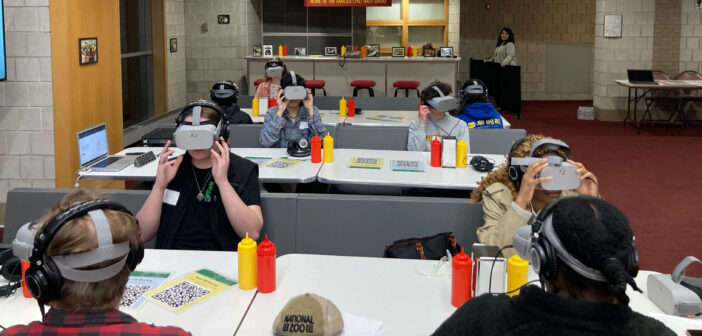Technology and the arts are converging in the virtual reality film “Traveling While Black” to transcend the Lehigh community through time, space and experiences.
“Traveling While Black,” which is hosted by Zoellner Arts Center through April 2, features a 20-minute virtual reality film that immerses viewers in the history of restricted movement for Black Americans.
According to the center’s website, the experience is intended to create safe spaces to facilitate dialogue about the challenges minority travelers still face today. It was developed and published by Felix & Paul Studios in partnership with the Phi Centre in Montreal, Canada.
“I was trying to think about how to impact a variety of people,” said Mark Wilson, executive director of Zoellner. “We know that this is going to be impactful for them to understand the history that isn’t shared in the school.”
Not only did Zoellner want to host the exhibit because of its impact, but Wilson said he wanted to further explore the connection between arts and technology.
Adam Ercolani, campus engagement manager for Zoellner, said the center is looking at how to use virtual reality to tell meaningful stories so audiences can better understand the perspectives or lives of people who are different from them.
Through this experience and understanding, Wilson said he hopes communities take a pause and think about how they can practice exercising more empathy towards others.
Emily Rosenberg, ‘25, who attended the experience with a friend, said she had no idea of what she was getting into. After participating, she said it was informative and impactful, and she was happy she attended.
“Being immersed in the story and the environment, and you’re looking around and experiencing what these people experience, I don’t think you would have gotten the same effect if it would have just been a film,” Rosenberg said.
Wilson said it has been his goal to incorporate more technology into the center since he interviewed for his position in 2020, as he feels it may lead to more engagement with Lehigh students.
Having a pre-existing relationship with the Phi Centre, he began the process of bringing “Traveling While Black” to Lehigh about 18 months ago.
Ercolani said employing virtual reality came with a rewarding learning curve. He is excited for more of the Lehigh community to have this new experience.
“It’s something that I was grateful to witness firsthand because we are on the precipice of this amazing intersection of arts and technology they’ve never seen before,” Ercolani said.
Will Lowry, theater professor, said the accessibility of virtual reality and artificial intelligence has allowed for the arts-technology convergence.
However, he said these “new” technologies have actually been around for decades. In his research, he found artists who were working with artificial intelligence 50 years ago.
The main barrier between art and technology, Lowry said, is the cost of integrating the two fields.
“Technology can be financially demanding to develop and investigate,” Lowry said. “Art is not often a financially rewarding (or) well-supported field. So in some cases, it takes time for that technology to get to the artists. So when we get to places where it becomes more available in mass, that’s where suddenly we can see a proliferation of artistic exploration.”
While “Traveling While Black” brings a new lens to the crossover conversation, the immersion of technology into the arts at Lehigh has been happening for some time.
Lowry said over the years, Lehigh has explored the integration between video and technology.
During the COVID-19 pandemic, he said, technology brought the arts to people who were restricted from in-person operations because of safety precautions.
“During the pandemic, even though it shut down our industry, it allowed for a lot of exploration,” Lowry said. “Maybe theater doesn’t have to always look like it did before.”
Having seen the success and opportunities deploying such technologies allow, Wilson said Zoellner plans to host more technologically focused performances with Phi Centre and other centers.
He said they are always trying to be ahead of the curve.
“I just tell people you can be the laggards or the late majority, or you can try to be the innovators,” Wilson said. “If you want to, you can certainly keep your traditions that are there, and you can also think about the longevity of your art form by thinking about how those folks who are younger want to engage with us.”






Comment policy
Comments posted to The Brown and White website are reviewed by a moderator before being approved. Incendiary speech or harassing language, including comments targeted at individuals, may be deemed unacceptable and not published. Spam and other soliciting will also be declined.
The Brown and White also reserves the right to not publish entirely anonymous comments.